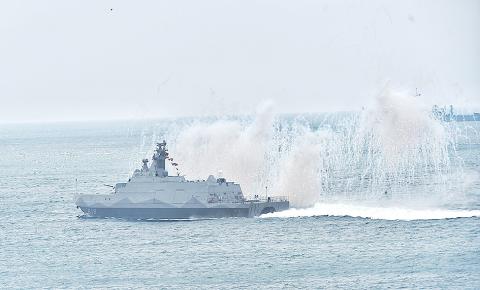Minister of National Defense Yen De-fa (嚴德發) yesterday confirmed plans to bring forward the nation’s construction of 11 Tuo Jiang-class corvettes by completing them in two instead of three phases.
Yen made the comments at a meeting of the legislature’s Foreign Affairs and Defense Committee in response to Democratic Progressive Party Legislator Lo Chih-cheng’s (羅致政) question about whether the military is making adjustments to counter the Chinese threat.
The corvette is a crucial piece of the military’s asymmetric warfare and shortening its construction schedule would increase the nation’s combat capability, Yen said.

Photo: Fang Pin-chao, Taipei Times
The ministry purchased 12 corvettes in total, with the first ship delivered in 2014, it said.
The other 11 corvettes are to come in two types: The first three anti-aircraft models are to be completed by 2025, while five anti-ship models, which were originally scheduled to be completed between 2030 and 2032, are to be brought forward to 2025, the ministry said.
The completion of the third batch, originally planned for 2039, could be moved forward as the need arises, it said.
The armaments of the third batch, whilst unknown, could include the extended range versions of the Hsiung Feng II (HF-II) anti-ship missiles and the HF-III missiles, which offer more effective deterrence against enemy vessels, the ministry said.
With a displacement of 700 tonnes, the anti-air variants are to be armed with ship-launched Tien Chien II missiles, while the anti-ship variant are to carry HF-II anti-ship missiles and HF-III supersonic anti-ship missiles, the ministry said.
The ministry has opted to contract the construction of the surface platforms via an open bid, but would commission the Chungshan Institute of Science and Technology to design and install the combat systems onboard, the ministry said.
The commission agreement and the public bid are to begin next month and should be completed by October, it said.
Navy Command Headquarters Chief of Staff of the Navy Vice Admiral Lee Tsung-hsiao (李宗孝) told lawmakers he is confident that the open bid would conclude successfully and that construction could begin next year.
Construction of the second batch will not necessarily have to wait for the completion of the first batch, Lee said, adding that it could begin as soon as next year or in 2020.
Yen also told the committee that the national defense budget would surely increase more than 2 percent for fiscal 2019.
The ministry will comply with President Tsai Ing-wen’s (蔡英文) instructions on increasing the national defense budget as a percentage of GDP by no less than 2 percent of the previous year’s budget, the ministry’s Comptroller Bureau Director Chen Kuo-sheng (陳國勝) said.

AIR SUPPORT: The Ministry of National Defense thanked the US for the delivery, adding that it was an indicator of the White House’s commitment to the Taiwan Relations Act Deputy Minister of National Defense Po Horng-huei (柏鴻輝) and Representative to the US Alexander Yui on Friday attended a delivery ceremony for the first of Taiwan’s long-awaited 66 F-16C/D Block 70 jets at a Lockheed Martin Corp factory in Greenville, South Carolina. “We are so proud to be the global home of the F-16 and to support Taiwan’s air defense capabilities,” US Representative William Timmons wrote on X, alongside a photograph of Taiwanese and US officials at the event. The F-16C/D Block 70 jets Taiwan ordered have the same capabilities as aircraft that had been upgraded to F-16Vs. The batch of Lockheed Martin

US President Donald Trump yesterday announced sweeping "reciprocal tariffs" on US trading partners, including a 32 percent tax on goods from Taiwan that is set to take effect on Wednesday. At a Rose Garden event, Trump declared a 10 percent baseline tax on imports from all countries, with the White House saying it would take effect on Saturday. Countries with larger trade surpluses with the US would face higher duties beginning on Wednesday, including Taiwan (32 percent), China (34 percent), Japan (24 percent), South Korea (25 percent), Vietnam (46 percent) and Thailand (36 percent). Canada and Mexico, the two largest US trading

GRIDLOCK: The National Fire Agency’s Special Search and Rescue team is on standby to travel to the countries to help out with the rescue effort A powerful earthquake rocked Myanmar and neighboring Thailand yesterday, killing at least three people in Bangkok and burying dozens when a high-rise building under construction collapsed. Footage shared on social media from Myanmar’s second-largest city showed widespread destruction, raising fears that many were trapped under the rubble or killed. The magnitude 7.7 earthquake, with an epicenter near Mandalay in Myanmar, struck at midday and was followed by a strong magnitude 6.4 aftershock. The extent of death, injury and destruction — especially in Myanmar, which is embroiled in a civil war and where information is tightly controlled at the best of times —

China's military today said it began joint army, navy and rocket force exercises around Taiwan to "serve as a stern warning and powerful deterrent against Taiwanese independence," calling President William Lai (賴清德) a "parasite." The exercises come after Lai called Beijing a "foreign hostile force" last month. More than 10 Chinese military ships approached close to Taiwan's 24 nautical mile (44.4km) contiguous zone this morning and Taiwan sent its own warships to respond, two senior Taiwanese officials said. Taiwan has not yet detected any live fire by the Chinese military so far, one of the officials said. The drills took place after US Secretary